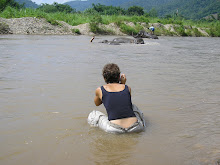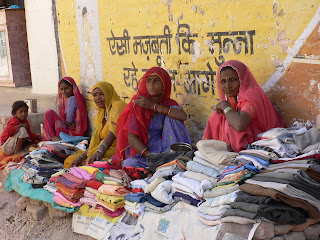 Occaisonally the train stops. Another wave of passengrs cramming to get int he door. Few disembark. It just keeps getting more crowded. The horn blows, distant so many cars ahead and the bright lights of the station fades. Leaving us rumbling in the dark.
Occaisonally the train stops. Another wave of passengrs cramming to get int he door. Few disembark. It just keeps getting more crowded. The horn blows, distant so many cars ahead and the bright lights of the station fades. Leaving us rumbling in the dark.The disabled remain disabled. so many. Coming from a priviledged land where medical care is widely available. Some spend their lives sweeping floors of trains, sweeping the debris and sandy dust from around our feet as passengers push past. Some are business men, some simply stick out their hand.
I could travel like this for days, watching my thoughts take form. Shapping them into coherent maps, letting htem go in the rush of the wind.
We must be nearing Delhi (Delli) now. The passing lights show shops and wallahs, buildings are one story taller. I am saddened that the hours somehow pass so quickly though I never close my eyes. I am seduced by the ambiguity of the day.
On the tracks women bundle children. men stand over the edge of the tracks to relieve themselves, others lit from the glow of their mobile phones. Picking their way across the tracks passengers begin exiting the musky cabin. The whistle hurries people aboard. We have not yet arrived, yet I am perfectly content ot be here. Surely I will know when we get there, I believe it is the end of the line. I will wait for a coolie to find me as the rush subsides and he will somehow lift up my bundles of sarees and effortless walk the stairs across the bridge and down to the main road while I scurry behind.
We are nearing the shanties by the tracks, small fires by the doors. Silhoutes of laundry hanging from rooftops, faceless bodies behind thread bare sheets of cloth and rusted tin. ladders leading to one room homes. Aluminum cups and plates stacked next to the bare mattress. Flourescent light spills into the night. I have arrived in Delhi.
I need to bring groups here. Stay up to date with my new tours at http://www,stressescapetours.com




 Once I accepted that my foolish notion of volunteering was indeed foolish, I placed myself into a jewellery making class to justify my time here. The class offered me a view to an inner circle of Pushkar, in fact maybe it was then that I began to emerge from my cocoon. I learned patience as tens of minutes would pass while harry, my teacher, chatted with whoever decided to drop by to say hello. I learned how to make rings and set stones, how to mold a piece of silver intoa work of art. This time forced me to be present. A melted pendant blantantly reminding me to stay present for the present.I came to India arrogant once again The white woman from America thinking she could make a diffrence. India doesn't need me. Oh, it desperately needs a better socialsystem, health care, clean water, jobs. But the systems have been put in place and have been working for centuries. Regardless of how I or anyone in the West may percieve this 'way' is entirely none of India's concern. I came wanting to find my heart. To hear it sing again. And as I always tell my companions whojoin me on my trips to Thailand, you may come for one thing, but the place, the place will k
Once I accepted that my foolish notion of volunteering was indeed foolish, I placed myself into a jewellery making class to justify my time here. The class offered me a view to an inner circle of Pushkar, in fact maybe it was then that I began to emerge from my cocoon. I learned patience as tens of minutes would pass while harry, my teacher, chatted with whoever decided to drop by to say hello. I learned how to make rings and set stones, how to mold a piece of silver intoa work of art. This time forced me to be present. A melted pendant blantantly reminding me to stay present for the present.I came to India arrogant once again The white woman from America thinking she could make a diffrence. India doesn't need me. Oh, it desperately needs a better socialsystem, health care, clean water, jobs. But the systems have been put in place and have been working for centuries. Regardless of how I or anyone in the West may percieve this 'way' is entirely none of India's concern. I came wanting to find my heart. To hear it sing again. And as I always tell my companions whojoin me on my trips to Thailand, you may come for one thing, but the place, the place will k



 Each morning I would have a milk coffee at my hotel, the Hotel Krishna, sitting in a wicker chair watching the sun come through the Persian arches of the compund. The streets would still be waking, the saddhus on their curbs, the cows chewing rubbish, shopkeepers slowly raising their metal do
Each morning I would have a milk coffee at my hotel, the Hotel Krishna, sitting in a wicker chair watching the sun come through the Persian arches of the compund. The streets would still be waking, the saddhus on their curbs, the cows chewing rubbish, shopkeepers slowly raising their metal do







































